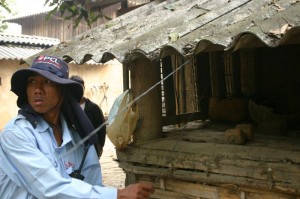Project Phongsali: Bombs in tricky locations require careful planning and execution!

A farmer put two cluster bombs in a chicken coop thinking it was a place beyond his children's reach. We had to use some creativity to conduct a safe demolition of those devices.
Day 45
When we go to the site of reported ordnance and find the items have gone missing, the first thing we do is scan the immediate countryside asking ourselves, “If I found ordnance and decided to move it in order to keep my family safe, where would I put it?” Then, we check all the logical places within an easy walk: on a tree stump, in a hollow log, in the bottom of a bomb crater. By thinking like villagers burdened with ordnance, we often find the missing item within minutes. Once, while looking for two missing pieces, we found a total of four on a termite mound. This week, while looking for a missing hand grenade, I peeked under a bamboo mat that looked out of place, and there it was.
When villagers find ordnance not in the forest but close to home, they face a greater challenge: they must contend with greater foot traffic, and they have fewer stumps and hollow trees to serve as a depository. Often their concern is for children who roam without boundaries, their curiosity carrying them hither and yon. It was to keep his children safe from ordnance that a guy in Nakai hid a bomblet in his rubber boot, and another fellow put one in his refrigerator.
“To keep them away from my children,” — there it was, the predictable rationale Mr. Bong offered to explain why he put two cluster bomblets in his chicken coop. They were M-83’s, devices more powerful than most of the other cluster munitions that we find here — and by reputation, a bit crankier.
The one sure indication that an M-83 is armed is a small post that unscrews as the bomblet falls through the air. If you find one without a post, you’ve got no guarantee that the bomblet is safe; but if you find one with a post protruding, it’s a sure bet that the bomblet has armed. Mr. Bong was the troubled owner of armed ordnance.
If the bomblets had been on the ground, no matter how close to a house, we would have refused to move them and would have destroyed them where they lay, trusting that a sizable mound of sandbags would minimize collateral damage. (You might well ask, “How many sandbags are enough?” The answer, of course, depends on the size of the bomb. Once, to limit the potential destruction from a 750-pound bomb under a house, the guys shoveled river sand into rice bags for days and days. In the end, they packed over a hundred bags around the bomb).
But Mr. Bong’s chicken coop was on stilts, elevating the bomblets about four feet off the ground, a situation demanding departure from standard operating procedures. (In America the solution would be to bring in a remote controlled robot to do the dirty work. Here, we had to devise a method that used only available materials and human power.)
After rousting all the villagers in Mr. Bong’s neighborhood from their homes, we rigged a cable from the coop to a distant tree. Then, without disturbing the bomblets, we bound them together with string, and suspended a plastic bag beneath the door of the coop. From a safe distance Vilasack, our new team leader, hunkered behind a massive tree and slowly drew in string to drag the bomblets out of the coop and over the mouth of the bag. After lowering the bomblets into the bag, Vilasack slowly pulled in string to move the bag along the cable. When the bag was smack on the other side of the tree, he let out string and lowered the bag to the ground. Then, all that remained was to stack six or eight bulging sand bags on top of the bomblets, set the charge, and bang them away.
The whole time we worked, a hen in the coop sat on her brood of eggs, refusing to move. Even the sound of 800 grams of TNT exploding 30 yards away failed to dislodge her. When the demolition was over and the dust and falling leaves had settled, there she sat, still guarding her brood. Good mom. Didn’t chicken out.
